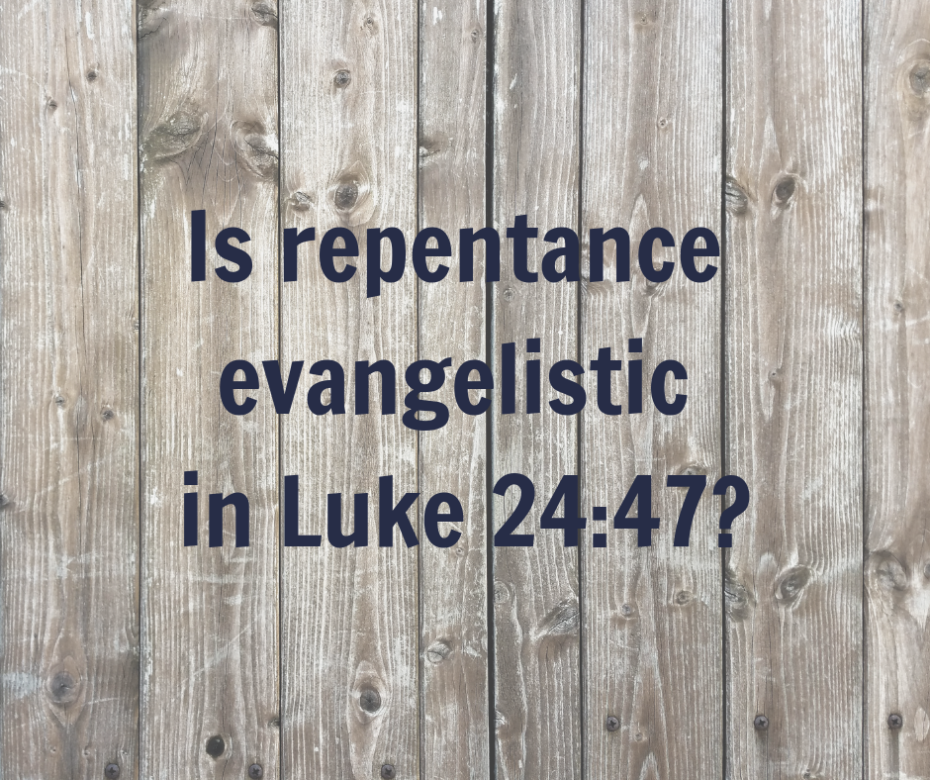While trying to clear out my Inbox, I found an email question that needs an answer:
Many in my church think repentance of sin is a required part of being born again. How would you explain the words of Jesus after the resurrection in Luke 24:45-47?
“And He opened their understanding, that they might comprehend the Scriptures. Then He said to them, ‘Thus it is written, and thus it was necessary for the Christ to suffer and to rise from the dead the third day, and that repentance and remission of sins should be preached in His name to all nations, beginning at Jerusalem.’”
Verse 47 does not speak of repentance and everlasting life. Nor does it speak of faith and the remission of sins. It speaks of repentance and remission of sins. The remission of sins is not the same as regeneration. Born again people must walk in the light of God’s Word (1 John 1:7) and confess their sins (1 John 1:9) in order to have fellowship forgiveness.
So, in one sense, there is no issue here.
However, as this is regarded by many as the Great Commission in Luke’s Gospel, we need to discuss it further.
There may be as many as five Great Commission texts, one each in the four Gospels and one in Acts. Here is what we see:
GC Text Evangelistic preaching? Discipleship preaching?
Matt 28:18-20 No Yes = “make disciples”
Mark 16:15-16 Yes = preach gospel No
Luke 24:47-49 ? ?
John 20:21-23 ? ?
Acts 1:6-8 ? ?
The Great Commission in Matthew is clearly discipleship.
In Mark, the Great Commission is evangelistic, but even there it has a discipleship aspect since it speaks of baptism. See this 1995 article by me and this article by Brad Doskocil (see IV. D.) for an explanation of Mark 16:16.
Let’s skip Luke 24:47 for the moment; the passage in John may or may not be a Great Commission passage. And it might refer to evangelism, discipleship, or both. Retaining or forgiving sins applies to both evangelism and discipleship.
Acts 1:8 is not a commission, but a prophetic word. The Lord wasn’t commanding the Eleven (ultimately He is referring to the Twelve here, including Matthias, whom the Lord knew would soon be given the office vacated by Judas) to be His witnesses. He was saying that they would receive miracle working power and they would be His witnesses. The Lord knew what was about to occur.
As the book of Acts shows, the ministry of the Apostles was both evangelistic and discipleship.
So, when we come to Luke 24:47, it could hypothetically be pre-evangelistic, evangelistic, discipleship, or all three. The forgiveness of sins is a pre-evangelistic issue (Acts 17:30), an evangelistic issue (Acts 10:43), and a discipleship issue (Acts 2:38; 22:16; see also 1 John 1:9) in Acts, which is part two of Luke-Acts. However, there is no hint in Luke 24:47 that the Lord is talking about starting the Christian life with a clean slate, that is, fellowship forgiveness of all past sins, which is what Acts 10:43 is talking about. Besides, in Acts 10:43 Peter says that “whoever believes in Him will receive remission of sins.” Peter wasn’t talking about repentance with Cornelius. But in Luke 24:47, the Lord is talking about repentance and remission of sins, a different situation entirely.
We know that the evangelistic message the Lord Jesus proclaimed and gave His Apostles to preach was the faith-alone message. The Lord never linked repentance and everlasting life. Indeed, the words repent and repentance do not even occur once in John’s Gospel. For further information regarding this argument about silence, see this excellent 1998 article by Zane Hodges.
Luke 24:47 is clearly a non-evangelistic passage since it does not mention believing in Jesus. It is thus either referring to pre-evangelistic or discipleship ministry, or both.
In Luke 24:47, the Lord tells the Eleven that they should preach repentance and the remission of sins to all nations, beginning in Jerusalem. They did that. But that ministry cannot be understood as their evangelistic message without destroying the faith-alone message of life.
One final note. Even unbelievers were called upon in Acts to repent. See Acts 17:30. As the unbelieving Ninevites discovered under Jonah’s preaching (Matt 12:41; Jonah 3:5-10), when unbelievers turn from their sinful ways, God forgives their sins and often suspends further judgment. (I’m not suggesting that God gives any unbeliever positional forgiveness of all his sins. What I’m suggesting is that He often forgives the specific sins for which an unbeliever repents. Notice in Matthew 9:2 that Jesus forgives the sins of a man who is not said to be a believer. The forgiveness seems to be for specific sins that resulted in this paralysis as Matthew 9:5 implies. See also John 5:14 for a similar example. And remember that at the cross Jesus said, “Father, forgive them, for they do not know what they do.” He was referring to the forgiveness of unbelievers.) And, of course, believers benefit from repentance as the three parables in Luke 15 show.


